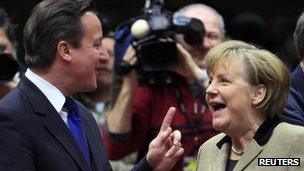Inclusive Cameron tones down EU rhetoric
- Published

Mr Cameron appeared to share a joke with German Chancellor Angela Merkel ahead of the summit
David Cameron says a new treaty paving the way for closer fiscal co-operation among EU members will not place obligations on the UK. BBC political correspondent Iain Watson examines his manoeuvrings in Brussels, which have upset some euro-sceptic backbenchers.
There was a determination that at this summit, the prime minister could not be portrayed as being isolated.
Instead he would be in the vanguard, chivvying up his counterparts to do more to encourage economic growth by cutting regulations.
He used more emollient language, praised the progress in this direction and looked forward to more concrete action at the next summit, when he could simply have suggested that more should have been achieved at this one.
And he reassured the press pack that all 27 countries were united in one respect at least - condemning the violence in Syria.
Further proof of his lack of isolation was provided when the Czech Republic also refused to sign up to the fiscal pact.
Bonhomie
The body language was different too. He strode confidently into the meeting, set out his stall, and made a half attempt at a hug with President Nicolas Sarkozy - who had appeared to sidestep his attempts at a handshake at the last summit.
But in particular, he wanted to maintain good relations with German Chancellor Angela Merkel. So the rhetoric from the December summit was decidedly toned down.
Instead of opposing any use of EU institutions in the service of countries which - unlike Britain - have agreed to sign the new fiscal treaty, both Downing Street and the Foreign Office said the UK was "reserving its position" and was only opposed to "inappropriate use of the EU institutions".
In part, this was because he felt Germany and the European Commission were helpful in fending off French demands to expand the scope of the fiscal treaty and in effect to create "an EU within the EU."
So he is not raising objections over the limited use of the institutions at this stage - instead he says it is in the national interest to allow eurozone countries to "sort out their mess".
But all the bonhomie - or perhaps camaraderie - comes at a price.
He will have to face his own backbenchers on his return to Britain, and some of them feel he has been too accommodating towards the 25 countries which have agreed to the new fiscal arrangements.
While some will be won over, others are already talking of "retreat"' and "appeasement".
- Published31 January 2012
- Published31 January 2012
- Published30 January 2012
- Published30 January 2012
- Published29 January 2012
- Published17 January 2012
- Published6 January 2012
- Published2 February 2012
- Published9 December 2011
- Published9 December 2011